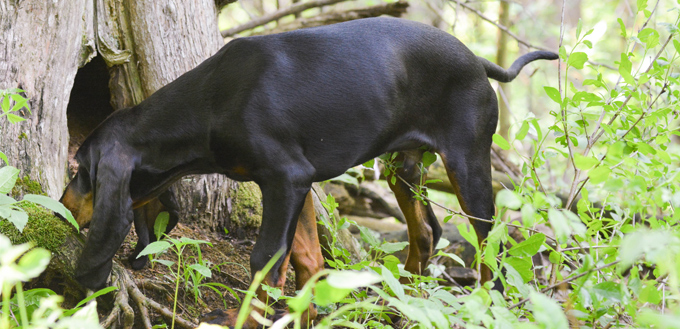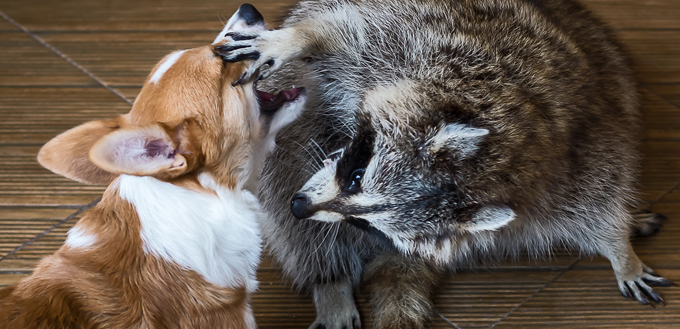There are now some folks who take raccoons into their homes and turn them into pets. And while these wild animals look so adorable and cute, thanks to Rocket of the Guardians of the Galaxy fame, they are still just that – wild animals. They may be cunning and smart, yet they can viciously attack man’s best friend, too. The raccoon-versus-dog is not a fight you’d want to encourage or no pet parent can bear to watch. So, is Rocket a real threat to Snoopy? Let’s find out.

Why Raccoons Attack Man’s Best Friend
Let us get this straight. Raccoons will never get out of their hiding places and territories just so they will actively seek out dogs for them to fight. As vicious as raccoons may be, they are not stupid to leave the relative safety and security of their ‘homes’ to invade another home just to pick a fight. No, they’re way too intelligent for that. So, why do raccoons attack dogs and cats and other pets?
There are two fundamental reasons why raccoons can show their aggressiveness. First, it is for self-preservation. When raccoons encounter dogs, they will try to get away as far as possible. Again, we are not discounting the possibility that the raccoon will face off with the dog right there and then. As long as there is an opportunity to escape, a raccoon will take that chance especially if it’s faced with a really large dog. If the coon faces off with a dog that is smaller or about the same size, it may stand its ground. After all, it honestly believes that it has a much better chance of fighting off this four-legged critter.
A raccoon will typically face off with a dog if it is already cornered. For example, a coon may go inside your fenced property and your dog sees it. The natural reaction of dogs is to run after the coon and chase it away. Remember, dogs are territorial, too. If another animal such as a coon enters their territory, they will try to defend it as much as possible.
Now, suppose your dog was able to corner the raccoon in one section of your backyard and the raccoon has nowhere else to go. There are no trees to climb to and the section of fence is too high for it to scale. In such instances, the coon will try to defend itself. It’s what nature dictates. When cornered, wild animals have to use any means necessary to fight their opponent and create an opportunity for escape.
Raccoons can attack, too, if it’s the dog that ventures into the coon’s territory, especially if the coon has its young to protect. You may be simply walking with your dog in the woods and a raccoon suddenly attacked your dog. Coons generally do not attack without cause. And the only probable cause in this instance is you and your dog’s trespassing into the coon’s territory.
The second reason why coons can attack dogs is food. Raccoons learn that there is plenty of food in your house. When they move out of their lair, they don’t visit your house to pick a fight with your dog. They visit your place because they know there’s food everywhere. And if you happen to feed your dog outside your home, leftover dog food is always a feast for coons. This puts them into a confrontation with your dogs. Why? Well, that food is your dog’s. Nobody else should eat it other than your dog.
Why Raccoons are Dangerous?
There are many reasons why raccoons are dangerous. First, they’ve got razor-sharp claws and teeth that they can use to disembowel smaller animals like cats and small dogs. Even larger dogs have been known to get severely injured complete with deep wounds, especially on the face. Generally, the raccoon will go for the dog’s eyes, knowing that if the dog cannot see or has impaired vision the raccoon can easily tear it to pieces.
Once the raccoon has scratched the dog’s eyes, it will attempt to roll the dog on its back and go for its belly. With one very swift motion of its claws, the coon can easily disembowel a dog. If this doesn’t work, it will continue biting and scratching. What is really astonishing about this animal is how quickly it moves. Its reflexes are phenomenal that it would be nearly impossible for the dog to catch up in terms of the raccoon’s slashing abilities.
If the raccoon happens to go for the dog’s chest, it can puncture its lungs and lead to its collapse. The dog will not be able to breathe. If it goes for the abdomen, it can puncture the intestines, spilling its contents into the abdomen and causing septic peritonitis. If the coon goes for the pelvis, there’s a chance that they can lacerate the dog’s urethra leading to urine accumulation under the dog’s skin and which can precipitate kidney failure.
Some raccoons have been observed to lure dogs into bodies of water where they drown. They will feign being trapped or cornered before they go into the water. Naturally, the dog follows the coon in the water and it’s here where the raccoon climbs onto the dog’s head and pushes it under the water.
Other than the injuries that dogs can sustain if they go face-to-face with raccoons, they can also be exposed to a variety of health conditions such as flea, mite, and tick infestation. If dogs eat items that have been contaminated with raccoon urine and feces, your dog may get roundworm infection, salmonellosis, or leptospirosis. They also carry rabies.
Are Dogs Afraid of Raccoons?
Generally, dogs are not afraid of raccoons. This is especially true for hunting dogs. While cats will always try to steer clear of the path of the furry masked bandit, a dog will never back down. First, they are curious and would want to check what this masked creature is. Second, dogs have an innate sense of responsibility to defend or protect their territories, resources, and even human families. Third, they are hunters.
However, it is crucial to understand that not all dogs will want to engage with a raccoon. There are also those dogs that may have already encountered a coon in the past and may already know what it’s like to be in a fight with a raccoon. In such instances, these dogs will try to avoid getting in contact with a coon as much as possible.

How Do I Protect My Dog from Raccoons?
Regardless of whether you have a coonhound or a toy dog in your house, it is best to protect your pet at all costs. Even if your dog doesn’t get injured for fighting a raccoon, there are other ways in which this wild animal can bring harm not only to your pet but also to other members of your family especially kids.
Securing your property is one of the best ways you can do to protect your pet. Any hole in your fence that can be used as access for the coon should be fixed. Traditional fences may be ineffective since these animals can easily climb. You might want to consider installing an electric fence instead. Even if you manage to make the fence high enough to discourage scaling, the raccoon may look for other ways to get in. It may look for an adjacent tree whose branches loom on your property. It can use this to gain access.
You May Also Like: Electric Dog Fences
Noise and floodlights can also help scare raccoons away. Some communities install large speakers that play barking noises of dogs or even tuned to a 24-hour radio show. The thing is that if they know there are humans present, raccoons will typically not want to go anywhere near this area. Floodlights can also help since raccoons are mostly nocturnal, flooding your property with lights will make them not want to go inside.
Make sure your house is spick and span. There’s a reason why raccoons keep on visiting your home. It’s not you or your dog that they are visiting – it’s food. These can be table scraps, leftovers, or even foods that are already in the garbage can. These are natural magnets for wild animals to come and invade your home.
Keeping your dog indoors is always one of the best ways you can protect your pet against raccoons. Engaging them in interactive activities should keep them from getting bored while indoors. And if you happen to bring them out for a walk, it is best to keep them on a leash. Most of the raccoon attacks that occur outside the home happened because the dog was not on a leash and it did not listen to the commands of its owners not to go after the raccoon. You cannot blame them, really. It’s part of their nature to be protective of their family. Unfortunately, the raccoon is thinking about the same thing.
Raccoons may look adorable, but they are clearly vicious animals that have the tendency to square off with your dog and very rarely lose a fight.







